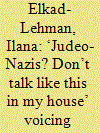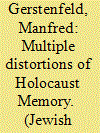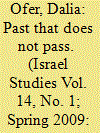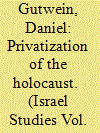| Srl | Item |
| 1 |
ID:
174030


|
|
|
|
|
| Summary/Abstract |
This article demonstrates how experiences of voicing traumas in Israeli society are reflected in art through Ezekiel’s World, a graphic novel by Michael Kovner. The novel explores relations between Holocaust survivors and their children (and grandchildren), whose complexity embodies the moral significance of Holocaust memory for Israelis. Both generations are preoccupied with the Holocaust as an existential crisis that determines contrasting generational attitudes towards military service and the occupation, resulting in the sacrificing of children and conversely, the abandonment of parents. The polyphonic novel voices these interrelated traumas via intertextual relations between painting, narrative, poetry, and documentary.
|
|
|
|
|
|
|
|
|
|
|
|
|
|
|
|
| 2 |
ID:
078808


|
|
|
| 3 |
ID:
086175


|
|
|
|
|
| Publication |
2009.
|
| Summary/Abstract |
The article raises issues that relate to the centrality of the Holocaust in the lives and imagination of many Israelis, and as a pivotal event that shapes their Jewish-Israeli identity. It examines the positions held by Israelis on the meaning of the Holocaust and the shaping of its memory, and asks whether the presence of the Holocaust in our lives represents an honest, unwavering effort to understand the Holocaust and its place in our world as human beings, Jews, and Israelis, or is a result of manipulating forces that use and abuse the memory of the Holocaust to advance unrelated political or social causes. The article presents a profusion of voices in Holocaust discourse and asks whether these are complementary or conflicting messages. It discusses the groups for whom the Holocaust was a personal experience, their offspring, who experienced the Holocaust as a family memory, and others whose memory of the Holocaust was shaped by survivors' testimonies, social processes, and the internalization of cultural messages. It focuses on the contribution of these groups in Holocaust research and artistic representation centering on literature, film, and music.
|
|
|
|
|
|
|
|
|
|
|
|
|
|
|
|
| 4 |
ID:
086176


|
|
|
|
|
| Publication |
2009.
|
| Summary/Abstract |
Politically and culturally the collective memory of the Holocaust plays a key role in constructing Israeli identity. Three main periods can be discerned in Holocaust memory in Israel: divided memory, nationalized memory, and privatized memory. This article discusses the privatization of the Zionist-nationalized memory of the Holocaust in Israel during the 1980s and 1990s as an ideological product of the privatization revolution through which Israel has gone. The article focuses on the role played by Post-Zionism in privatizing Holocaust memory by depicting Zionist ideology and Israeli politics that portrayed the nationalized memory as oppressive. In privatizing Holocaust memory, Post-Zionism reaffirmed its nature as the meta-ideology of the Israeli privatization revolution and dismantling of the welfare state.
|
|
|
|
|
|
|
|
|
|
|
|
|
|
|
|